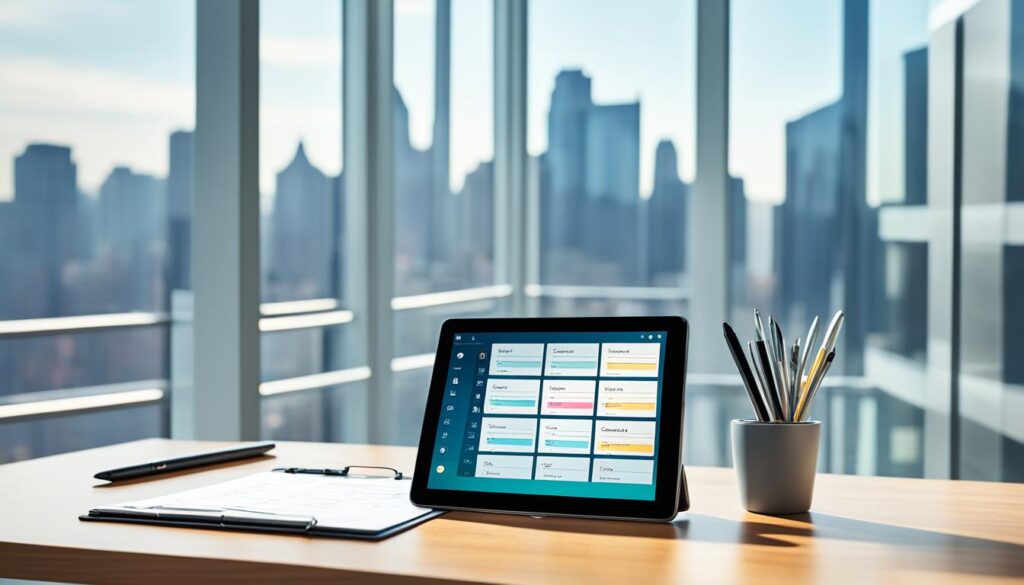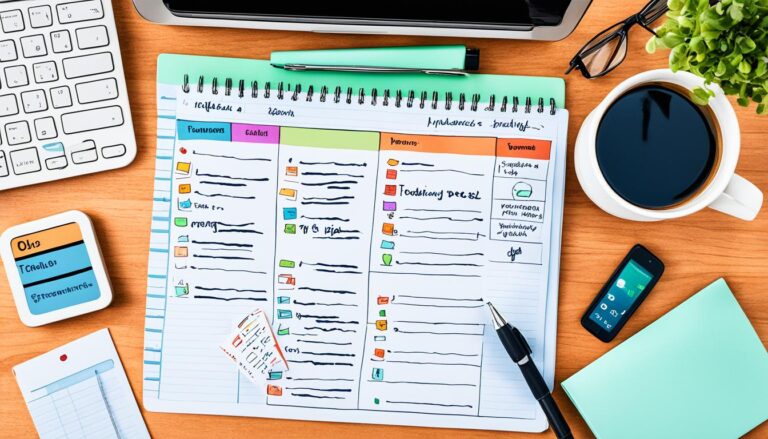Unlock Your Potential with Time Management Skills

“The key is not to prioritize what’s on your schedule, but to schedule your priorities.” – Stephen Covey
Do you often find yourself overwhelmed by the never-ending list of tasks and responsibilities? Are you struggling to find a balance between your personal and professional life? Effective time management is the solution you’ve been searching for. It’s time to take control of your schedule, boost your productivity, and unlock your full potential.
Time management coaching is a unique and personalized approach to improving productivity and reducing stress. With the help of a coach, you can learn how to prioritize tasks effectively, delegate responsibilities, improve focus, manage your energy levels, and make better use of technology. Time management coaching empowers you to make lasting changes and reach your full potential in both your personal and professional life.
In this article, we’ll explore the key elements of time management skills and provide you with practical tips and techniques to enhance your productivity. Let’s dive in and unlock the power of effective time management!
Key Takeaways:
- Prioritize tasks based on urgency, importance, and deadline
- Delegate tasks efficiently to free up time for other responsibilities
- Improve focus by minimizing distractions and utilizing time management tools
- Manage your energy levels to avoid burnout and sustain high productivity
- Make better use of technology to optimize your time and reduce digital clutter
Prioritize Tasks Effectively
When it comes to effective time management, one of the key skills to master is prioritizing tasks. Time management coaches can provide you with valuable strategies to help you prioritize tasks and stay focused on what truly matters.
So, how do you prioritize tasks effectively? It all starts with understanding the importance, urgency, and deadline of each task. By assessing these factors, you can determine which tasks require immediate attention and which can be scheduled for later.
Here are some time management strategies to help you prioritize tasks:
- Make a to-do list: Start by listing down all the tasks you need to complete. This will give you a clear overview of what needs to be done.
- Categorize tasks: Group similar tasks together to make it easier to prioritize. For example, you can categorize tasks as “urgent,” “important,” or “non-essential.”
- Set deadlines: Assign deadlines to each task. This will create a sense of urgency and help you prioritize accordingly.
- Consider the impact: Evaluate the potential impact of completing each task. Focus on tasks that will have the greatest positive impact on your goals.
- Delegate when possible: If certain tasks can be delegated to others, consider doing so. Delegating frees up your time to focus on tasks that require your expertise.
Prioritizing tasks effectively allows you to allocate your time and energy to the most important and impactful activities. By doing so, you can reduce stress, increase productivity, and achieve your goals more efficiently.
Stay organized with a task prioritization table
To help you prioritize tasks effectively, you can create a task prioritization table. This table will provide a visual representation of your tasks, their importance, and deadlines. Here’s an example:
| Task | Importance | Urgency | Deadline |
|---|---|---|---|
| Project proposal | High | High | 3 days |
| Client meeting | High | Medium | 1 day |
| Research article | Medium | Low | 5 days |
| Team meeting | Low | Medium | 2 days |
| Follow-up emails | Low | Low | 1 day |
Using a task prioritization table like this helps you visualize and compare the importance, urgency, and deadlines of your tasks. It allows you to make informed decisions about which tasks to prioritize and tackle first.
Delegate Tasks Efficiently
Delegating tasks is a crucial aspect of effective time management. By learning how to delegate tasks efficiently, you can free up valuable time and focus on responsibilities that require your attention and expertise. Time management coaches provide guidance on identifying tasks that can be delegated, effectively communicating with team members or coworkers, and ensuring clarity and alignment.
Identify Delegable Tasks
One of the first steps in delegating tasks is identifying which ones can be effectively handed off to others. Time management coaches can help you assess your workload, determine tasks that can be delegated without compromising quality, and prioritize responsibilities that require your personal attention.
Communicate Effectively
Clear and efficient communication is key to successful task delegation. Coaches guide you on how to communicate expectations, deadlines, and any necessary instructions to the person or team you are delegating the task to. This promotes understanding, reduces the need for follow-ups, and ensures everyone is on the same page.
Build Trust and Empower Others
Delegate tasks in a way that empowers those you are assigning them to. This helps build trust and confidence among team members or coworkers, as they feel valued and capable of taking on important responsibilities. Time management coaches provide strategies for fostering a sense of ownership and accountability in those you delegate tasks to.
Monitor Progress and Provide Support
Effective delegation involves monitoring the progress of delegated tasks to ensure they are being carried out successfully. Coaches can guide you on establishing checkpoints and communication channels to stay informed about the status of delegated tasks. Additionally, coaches help you support those you delegate tasks to by providing the necessary resources, guidance, and feedback.
When you delegate tasks efficiently, you create a collaborative and productive work environment. By empowering others to take ownership of certain responsibilities, you not only lighten your workload but also cultivate a sense of shared purpose and growth within the team or organization.

| Benefits of Efficient Task Delegation |
|---|
| 1. Frees up time for high-priority tasks |
| 2. Empowers and develops team members |
| 3. Enhances collaboration and teamwork |
| 4. Increases overall productivity |
| 5. Builds trust and reinforces relationships |
Improve Focus and Eliminate Distractions
Distractions can significantly impact your productivity and hinder your ability to focus on tasks. With effective time management, you can minimize distractions and improve your ability to concentrate. Time management coaches understand that each individual has unique distractions and provide tailored strategies to help you eliminate them. By setting boundaries, utilizing technology effectively, and creating an organized work environment, you can optimize your focus and productivity.
Setting Boundaries
One way to improve focus is by setting boundaries. This means establishing clear guidelines for yourself and others regarding interruptions and distractions. Communicate with your colleagues and loved ones about your dedicated working hours and ask them to respect your focus during these times. By doing so, you can create a conducive environment for deep work and minimize disruptions.
Utilizing Technology
Technology can be both a blessing and a curse when it comes to focus. While it provides opportunities for increased productivity, it can also be a major source of distraction. Discover tools and applications that can help you stay focused and eliminate unnecessary interruptions. Consider using website blockers to restrict access to distracting websites, turning off non-essential notifications, and utilizing productivity apps that encourage focus and time management.
Creating an Organized Work Environment
Your physical surroundings play a significant role in your ability to concentrate. Eliminate clutter and create an organized workspace that promotes focus. Keep only essential items on your desk and ensure that your environment is free from unnecessary distractions. Additionally, consider using visual cues like to-do lists and color-coded calendars to prioritize tasks and keep your focus on what needs to be accomplished.

Recommended Time Management Tools and Techniques
In addition to setting boundaries, utilizing technology, and creating an organized work environment, there are various time management tools and techniques that can help you improve focus and eliminate distractions. Here are some recommendations:
- Pomodoro Technique: This technique involves working for a set amount of time (usually 25 minutes) and then taking a short break. This structured approach can enhance focus and prevent burnout.
- Time Tracking Software: Use time tracking software to monitor how much time you spend on different tasks. This can help you identify patterns, manage your time effectively, and allocate more focus to high-priority activities.
- Task Management Apps: Task management apps help you stay organized and focused by allowing you to create to-do lists, set deadlines, and track your progress. These apps can help you prioritize tasks and minimize distractions.
| Time Management Tools | Key Features |
|---|---|
| Pomodoro Technique | Increases focus, prevents burnout |
| Time Tracking Software | Monitors time spent on tasks, improves time allocation |
| Task Management Apps | Organizes tasks, sets deadlines, tracks progress |
Manage Energy Levels and Avoid Burnout
Managing energy levels is essential for maintaining productivity and overall well-being. When your energy is depleted, it becomes challenging to focus, make decisions, and complete tasks efficiently. To prevent burnout and sustain a high level of productivity, it’s crucial to manage your energy effectively.
With the help of a time management coach, you can identify energy-draining habits that may be holding you back. These coaches can guide you in developing personalized strategies to maintain high energy levels throughout the day.
Developing Healthy Habits
One effective strategy for managing energy levels is prioritizing sleep. Aim for a consistent sleep schedule and create a sleep environment that promotes relaxation. Enhancing the quality of your sleep can greatly impact your energy levels and cognitive function.
Regular exercise is another crucial aspect of managing your energy. Engaging in physical activity releases endorphins, improves circulation, and boosts overall energy levels. Incorporate exercise into your daily routine to reap its energizing benefits.
Stress management techniques can also contribute to maintaining optimal energy levels. Identify stressors in your life and find healthy ways to cope with them, such as practicing mindfulness, deep breathing exercises, or engaging in hobbies that bring you joy.
The Power of Nutrition
Proper nutrition plays a significant role in managing energy levels. Fuel your body with nutrient-rich foods that provide sustained energy throughout the day. Incorporate whole grains, lean proteins, fruits, and vegetables into your diet to optimize energy levels and mental clarity.
Avoid relying on sugary snacks and drinks as a temporary energy boost, as they can lead to crashes and increased fatigue. Instead, opt for balanced meals and snacks that nourish your body and provide sustainable energy.

By implementing these time management strategies and adopting healthy habits, you can effectively manage your energy levels and avoid burnout. Prioritizing self-care and maintaining high energy levels will empower you to tackle tasks with focus, enthusiasm, and productivity.
| Energy-Boosting Foods | Benefits |
|---|---|
| Leafy Greens (spinach, kale) | Rich in iron and antioxidants, promote mental clarity and focus |
| Nuts and Seeds | Provide healthy fats, vitamins, and minerals for sustained energy |
| Fatty Fish (salmon, tuna) | High in omega-3 fatty acids, boost brain health and cognitive function |
| Whole Grains (quinoa, brown rice) | Slow-release carbohydrates provide long-lasting energy |
| Lean Proteins (chicken, tofu) | Aid in muscle repair and provide essential amino acids for energy |
Make Better Use of Technology
In today’s digital age, technology plays a significant role in our daily lives. Harnessing the power of technology tools can greatly enhance your productivity and time management skills. With the guidance of time management coaches, you can learn how to make better use of technology and optimize your time effectively.
One essential technology tool for improved time management is time tracking software. These software applications help you keep track of the time spent on different tasks and projects, allowing you to analyze your productivity and make adjustments as needed. By using time tracking software, you can gain valuable insights into how your time is being utilized and identify areas for improvement.
Another valuable technology tool that coaches can recommend is project management software. These tools enable you to plan, organize, and collaborate on various projects efficiently. With project management software, you can create task lists, set deadlines, assign responsibilities, and track progress, ensuring that everyone involved is on the same page and working towards the project’s successful completion.
Effective email management is also crucial for better time management. Coaches can provide strategies for organizing and prioritizing your inbox, reducing email overload, and responding to emails more efficiently. By implementing these email management techniques, you can spend less time dealing with emails and focus more on essential tasks and projects.
Benefits of Making Better Use of Technology:
- Optimize your time and increase productivity
- Reduce digital clutter and improve organization
- Enhance collaboration and teamwork
- Gain insights into your time usage and make informed decisions
- Streamline communication and reduce email overload
By leveraging technology tools, such as time tracking software, project management software, and effective email management strategies, you can streamline your workflows, eliminate unnecessary tasks, and achieve greater efficiency in your daily activities. The right technology tools, combined with effective time management techniques, can truly transform the way you work.

Time Management at Work
When it comes to the workplace, effective time management skills are crucial for maintaining productivity and achieving success. By implementing proven strategies and techniques, you can optimize your time, increase efficiency, and ultimately achieve a healthy work-life balance.
Plan Your Days
Start each day with a clear plan of action. Take a few moments to review your tasks and responsibilities, and create a prioritized to-do list. This will help you stay organized and focused, ensuring that you tackle the most important tasks first.
Prioritize Tasks
Not all tasks are created equal. By prioritizing your tasks based on urgency and importance, you can ensure that you devote your time and energy to what matters most. Use a simple ranking system or a time management matrix to categorize tasks and focus on high-priority items.
Set Boundaries
One of the biggest challenges in managing time effectively is avoiding distractions and interruptions. Set clear boundaries with your colleagues, clients, and even yourself. Let them know your availability, establish designated work hours, and create a conducive work environment that minimizes disruptions.
Say No to Non-Essential Tasks
Learning to say no is a powerful time management skill. Be selective about the tasks and commitments you take on. If a task doesn’t align with your priorities or goals, politely decline or delegate it to someone else. Focus on what truly matters and avoid unnecessary time drains.
Delegate Responsibilities
Recognize that you can’t do everything on your own. Delegate tasks to capable team members or colleagues who have the skills and capacity to handle them. Effective delegation not only frees up your time but also empowers others and fosters a sense of teamwork.
Implement Time Blocking
Time blocking is a technique that involves scheduling specific blocks of time for different tasks or activities. By dedicating uninterrupted time to important tasks, you can maximize your productivity and avoid getting overwhelmed. Use online calendars or time management apps to allocate time for focused work, meetings, breaks, and personal tasks.
Utilize Productivity Tools
Technology can be your ally in managing time efficiently. Explore various productivity tools and software that can help you streamline your workflow, track your progress, and stay organized. From project management platforms to time tracking apps, find the tools that best suit your needs and integrate them into your daily routines.
Remember, effective time management is a continuous process of improvement. Experiment with different techniques, evaluate their impact on your productivity, and make adjustments as needed. By honing your time management skills, you can optimize your workday, accomplish more, and find greater satisfaction in your professional life.
| Time Management Benefits at Work | Productivity Tips |
|---|---|
| 1. Increased efficiency and output | 1. Prioritize tasks effectively |
| 2. Reduced stress and overwhelm | 2. Delegate tasks efficiently |
| 3. Improved focus and concentration | 3. Manage energy levels and avoid burnout |
| 4. Enhanced work-life balance | 4. Make better use of technology |
Conclusion
Mastering time management skills is crucial for unlocking your productivity and achieving a harmonious work-life balance. By effectively prioritizing tasks, delegating responsibilities, improving focus, managing energy levels, harnessing technology, and implementing proven time management strategies, you can unleash your full potential in both your personal and professional life.
With the guidance and support of a time management coach, you can navigate the challenges of juggling multiple responsibilities and optimize your productivity. A coach will provide personalized techniques tailored to your unique needs, empowering you to make lasting changes and reach new heights of success.
By honing your time management skills, you can experience the satisfaction of efficiently completing tasks, meeting deadlines, and having more time for the activities and people you love. Achieving work-life balance becomes attainable when you have the tools and knowledge to manage your time effectively.
Investing in time management coaching offers a transformative opportunity to gain control over your schedule, reduce stress, and achieve greater fulfillment in all areas of your life. Unlock your potential, enhance your productivity, and create a sustainable work-life balance through the power of effective time management.






